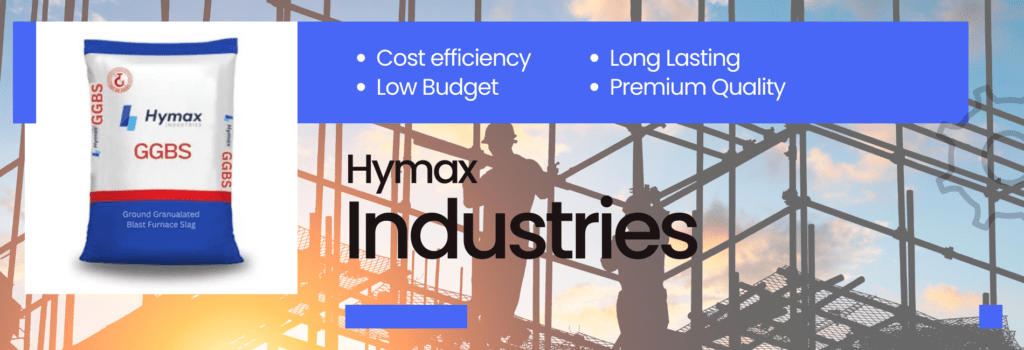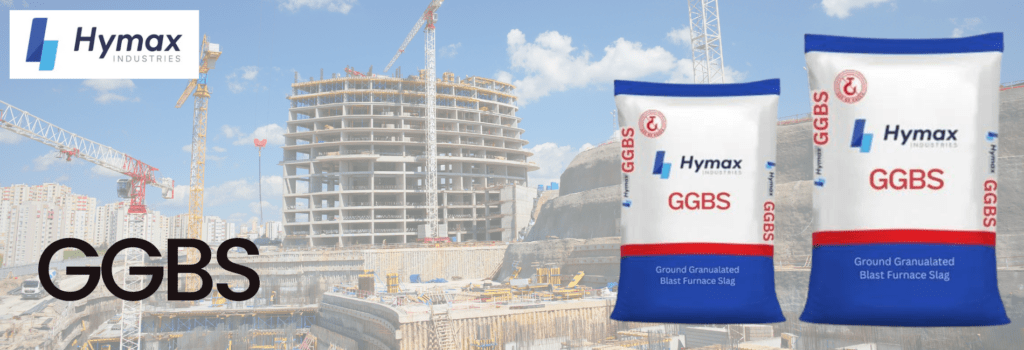
Intro – Best Ground Granulated Blast Slag (GGBS)
The construction industry plays a crucial role in shaping our world, but it also faces the challenge of minimizing its environmental footprint. One innovative solution gaining traction is Ground Granulated Blast Furnace Slag (GGBS), a revolutionary material offering numerous advantages over traditional building materials. Hymax Industries is the Best Ground Granulated Blast Slag (GGBS) Manufacturer in India.
What is GGBS?
GGBS is a byproduct from the iron and steel industry. During the production process, molten slag from a blast furnace is rapidly quenched with water, resulting in a finely-ground glassy material. Traditionally considered waste, GGBS has been transformed into a valuable and sustainable resource for the construction industry.
Why Use GGBS? Here are the Compelling Reasons:
- Reduced Carbon Footprint: Manufacturing Portland cement, a key component in traditional concrete, releases significant CO2 emissions. GGBS production boasts a much lower carbon footprint, making it an eco-friendly alternative.
- Enhanced Durability: GGBS improves the durability and longevity of concrete structures. Its resistance to chloride and sulfate attacks translates to longer-lasting buildings and infrastructure.
- Improved Workability: GGBS concrete exhibits better workability, making it easier to place and finish, leading to improved construction efficiency.
- Cost-Effectiveness: GGBS can be a cost-competitive option compared to ordinary Portland cement, especially in regions with readily available GGBS.
Applications of GGBS in Construction:
- Concrete production: GGBS is partially substituted for Portland cement in concrete mixes, reducing the overall carbon footprint and enhancing the concrete’s properties.
- Precast concrete elements: GGBS offers numerous benefits in precast applications, such as improved strength, durability, and reduced shrinkage.
- Repair and restoration: Due to its superior resistance to harsh chemicals and weather conditions, GGBS is well-suited for concrete repair and restoration projects.

Advantages & Disadvantages Of GGBS.
Ground Granulated Blast Furnace Slag (GGBS) has emerged as a game-changer in the construction industry, offering a more sustainable and eco-friendly alternative to traditional materials. However, like any material, it comes with its own set of advantages and disadvantages.
Advantages of GGBS:
- Reduced Carbon Footprint: Compared to Portland cement, the primary component in traditional concrete, GGBS boasts a significantly lower carbon footprint during production. This translates to greener construction practices and a smaller environmental impact.
- Enhanced Durability: GGBS concrete exhibits superior strength and resistance to factors like chloride and sulfate attacks. This translates to longer-lasting structures with minimal maintenance requirements.
- Improved Workability: GGBS concrete offers better workability compared to ordinary concrete. This translates to easier placement, finishing, and improved construction efficiency.
- Cost-Effectiveness: In regions with readily available GGBS, it can be a cost-competitive option compared to using solely Portland cement.
Disadvantages of GGBS:
- Slower Hydration: GGBS hydrates at a slower rate compared to Portland cement. This can be a disadvantage in situations requiring rapid hardening or cold weather conditions.
- Potential for Efflorescence: Under certain circumstances, GGBS concrete can be prone to efflorescence, a white crystalline deposit appearing on the surface. This is primarily an aesthetic concern and can often be mitigated with proper curing practices.
- Quality Control: The quality and performance of GGBS can vary depending on the source and manufacturing process. Strict quality control measures are crucial to ensure consistent performance.
- Limited Availability: In some regions, GGBS availability might be limited, impacting its widespread adoption.
Additional Considerations:
- Storage Requirements: GGBS requires proper storage to prevent moisture absorption and maintain its properties.
- Compatibility: Compatibility testing with other concrete mix components might be necessary to ensure optimal performance.
Overall, GGBS presents a significant step towards sustainable construction. Its numerous advantages outweigh the disadvantages, especially when considering the environmental benefits. However, careful planning, proper quality control, and addressing potential limitations are crucial for successful implementation.
Here are some additional points to consider:
- Advancements in GGBS technology are continuously improving its properties and addressing limitations like slower hydration.
- Combining GGBS with admixtures can help mitigate challenges like workability and efflorescence.
- Educating stakeholders about the benefits and considerations of using GGBS is essential for wider adoption in the construction industry.
By acknowledging both the advantages and disadvantages of GGBS, we can ensure its responsible and effective utilization in building a more sustainable future for construction. Hymax Industries is the Best Ground Granulated Blast Slag (GGBS) Manufacturer in India.
Building a Sustainable Future:
By incorporating GGBS into construction practices, we can significantly reduce the environmental impact of the industry. This translates to:
- Lower CO2 emissions during construction
- More durable and long-lasting structures
- Reduced reliance on virgin resources
Looking Ahead:
GGBS is a promising solution for promoting sustainable construction practices. As research and development continue, we can expect even wider adoption of this innovative material, paving the way for a greener future for the construction industry. Hymax Industries is the Best Ground Granulated Blast Slag (GGBS) Manufacturer in India.

